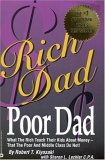Summary | Excerpt | Reviews | Readalikes | Genres & Themes | Author Bio

What the Rich Teach Their Kids about Money--that the Poor and the Middle Class Do Not!
by Robert Kiyosaki, Sharon L. Lechter
Money is not taught in schools. Schools focus on scholastic and professional skills, but not on financial skills. This explains how smart bankers, doctors and accountants who earned excellent grades in school may still struggle financially all of their lives. Our staggering national debt is due in large part to highly educated politicians and government officials making financial decisions with little or no training on the subject of money.
I often look ahead to the new millennium and wonder what will happen when we have millions of people who will need financial and medical assistance. They will be dependent on their families or the government for financial support. What will happen when Medicare and Social Security run out of money? How will a nation survive if teaching children about money continues to be left to parents—most of whom will be, or already are, poor?
Because I had two influential fathers, I learned from both of them. I had to think about each dad's advice, and in doing so, I gained valuable insight into the power and effect of one's thoughts on one's life. For example, one dad had a habit of saying, "I can't afford it." The other dad forbade those words to be used. He insisted I say, "How can I afford it?" One is a statement, and the other is a question. One lets you off the hook, and the other forces you to think. My soon-to-be-rich dad would explain that by automatically saying the words "I can't afford it," your brain stops working. By asking the question "How can I afford it?" your brain is put to work. He did not mean buy everything you wanted. He was fanatical about exercising your mind, the most powerful computer in the world. "My brain gets stronger every day because I exercise it. The stronger it gets, the more money I can make." He believed that automatically saying "I can't afford it" was a sign of mental laziness.
Although both dads worked hard, I noticed that one dad had a habit of putting his brain to sleep when it came to money matters, and the other had a habit of exercising his brain. The long-term result was that one dad grew stronger financially and the other grew weaker. It is not much different from a person who goes to the gym to exercise on a regular basis versus someone who sits on the couch watching television. Proper physical exercise increases your chances for health, and proper mental exercise increases your chances for wealth. Laziness decreases both health and wealth.
My two dads had opposing attitudes in thought. One dad thought that the rich should pay more in taxes to take care of those less fortunate. The other said, "Taxes punish those who produce and reward those who don't produce."
One dad recommended, "Study hard so you can find a good company to work for." The other recommended, "Study hard so you can find a good company to buy."
One dad said, "The reason I'm not rich is because I have you kids." The other said, "The reason I must be rich is because I have you kids."
One encouraged talking about money and business at the dinner table. The other forbade the subject of money to be discussed over a meal.
One said, "When it comes to money, play it safe, don't take risks." The other said, "Learn to manage risk."
One believed, "Our home is our largest investment and our greatest asset." The other believed, "My house is a liability, and if your house is your largest investment, you're in trouble."
Both dads paid their bills on time, yet one paid his bills first while the other paid his bills last.
One dad believed in a company or the government taking care of you and your needs. He was always concerned about pay raises, retirement plans, medical benefits, sick leave, vacation days and other perks. He was impressed with two of his uncles who joined the military and earned a retirement and entitlement package for life after twenty years of active service. He loved the idea of medical benefits and PX privileges the military provided its retirees. He also loved the tenure system available through the university. The idea of job protection for life and job benefits seemed more important, at times, than the job. He would often say, "I've worked hard for the government, and I'm entitled to these benefits."
Copyright © 1997, 1998 by Robert T. Kiyosaki and Sharon L. Lechter






Your guide toexceptional books
BookBrowse seeks out and recommends the best in contemporary fiction and nonfiction—books that not only engage and entertain but also deepen our understanding of ourselves and the world around us.